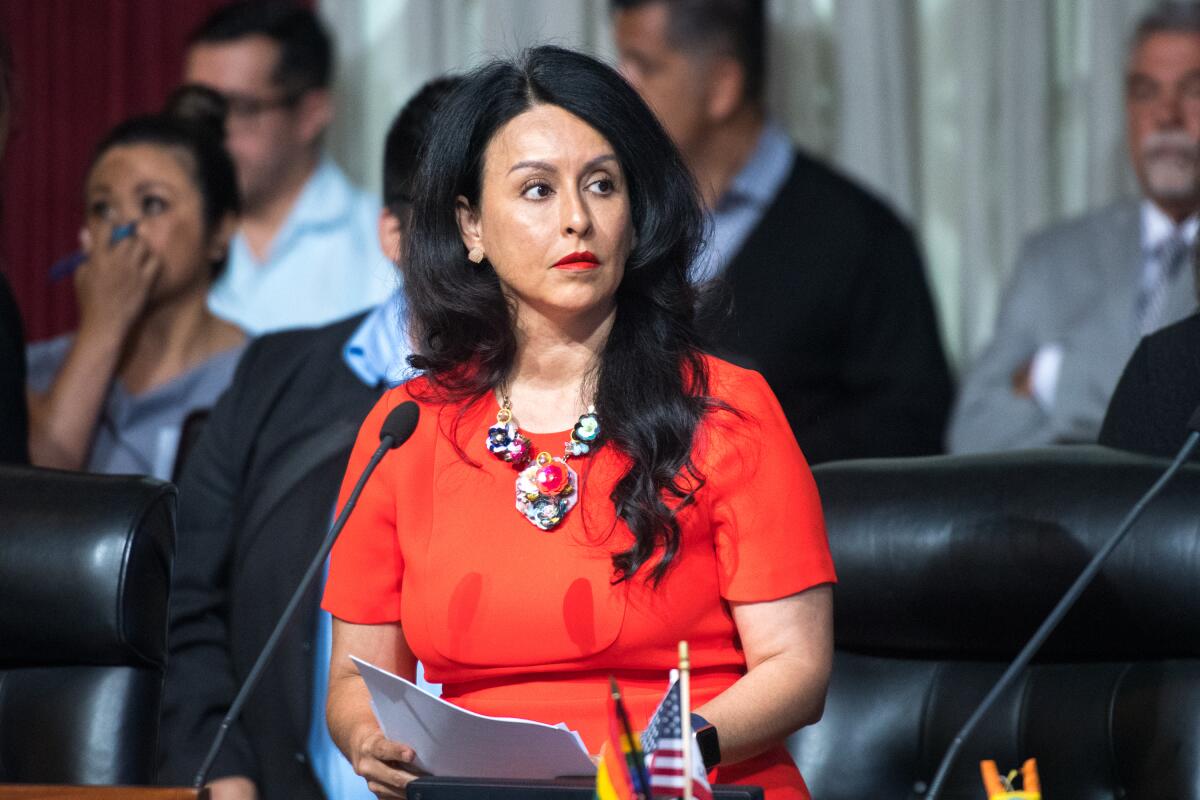L.A. City Council passes $100-million coronavirus rent relief program

Nearly 50,000 Los Angeles families hurt by the economic and health fallout from the COVID-19 pandemic could get help from a $100-million rent relief program passed by the City Council on Tuesday.
The money would provide up to $2,000 in rental assistance for low-income households who have lost work, fallen ill or had to assist sick family members during the crisis.
âI am reminded every day during this ongoing pandemic that people, especially those in disenfranchised communities, are struggling,â City Council President Nury Martinez, who authored the measure, said in a statement. âThis program will help tens of thousands of Angelenos, and thatâs wonderful news.â
The efforts aims to address the economic fallout from the coronavirus outbreak, which has led to a nearly 21% unemployment rate in L.A. County. While the $100-million effort is the largest passed by any U.S. city to help tenants pay their rent, it would still fall short of reaching all who have been affected by the pandemic in Los Angeles. According to one estimate by UCLAâs Luskin Institute on Inequality and Democracy, for instance, about 365,000 households countywide have lost their jobs, do not have access to unemployment benefits and are at risk of losing their homes once anti-eviction moratoriums expire.
To qualify for the city program, tenants will have to prove theyâve been affected financially or had health problems due to the coronavirus. The city will pay a tenantâs rent up to $1,000 per month, with a maximum payment of $2,000 per household. The money would go directly to the tenantsâ landlords.
Tenants also must make no more than 80% of the median income in the area â $83,500 for a family of four â to be eligible. In an effort to direct the money to those who most need it, half the funding will be reserved for those making no more than 30% of the area median income, or $31,300 for a family of four.
The city expects the bulk of the subsidies, which come from the $694 million the city received from the federal governmentâs coronavirus stimulus program passed in March, to be given out between August and October, according to a report from the Housing and Community Investment Department. Approximately 16,000 families will receive assistance in each of those months, the report estimated.
Currently, nearly all evictions in California are on hold because the state court system is not processing cases except for those deemed emergencies. The city of Los Angeles has passed additional tenant protections, barring evictions for those unable to pay rent due to the coronavirus and allowing renters a year after the expiration of the state of emergency to make up any past due rent. If tenants and landlords receive funding from the cityâs rental assistance program, landlords must agree not to raise rent during that repayment period.
L.A. County also began advancing rental assistance efforts on Tuesday, with supervisors asking staff members to develop a similar program with $20 million in funding.
So far, tenants in Los Angeles and nationwide appear to have been able to keep up with their rent payments much more than many analysts had anticipated, given the economic hardships caused by the virus.
The National Multifamily Housing Council, a Washington, D.C.-based landlord trade group, found that more than 92% of tenants have paid at least part of this monthâs rent, a figure unchanged from last June. The councilâs survey covers 11.4 million professionally managed apartments â about a quarter of the nationâs rental market.
In California, nearly 83% of adults living in rental homes reported paying their rent last month in a U.S. Census Bureau survey conducted between June 4 and June 9.
As part of the federal stimulus plan, Congress increased unemployment benefits to provide those who have lost jobs with an additional $600 a week, which the housing council credits with helping tenants make their payments. Those expanded unemployment benefits, however, are scheduled to expire at the end of July, leading some to worry that many more tenants will quickly fall behind.
âWe need substantially more assistance from the White House and our federal government if we are going to meet the housing needs of Angelenos and people throughout the nation,â Martinez said.
Times staff writer Jaclyn Cosgrove contributed to this report.
More to Read
Sign up for Essential California
The most important California stories and recommendations in your inbox every morning.
You may occasionally receive promotional content from the Los Angeles Times.







